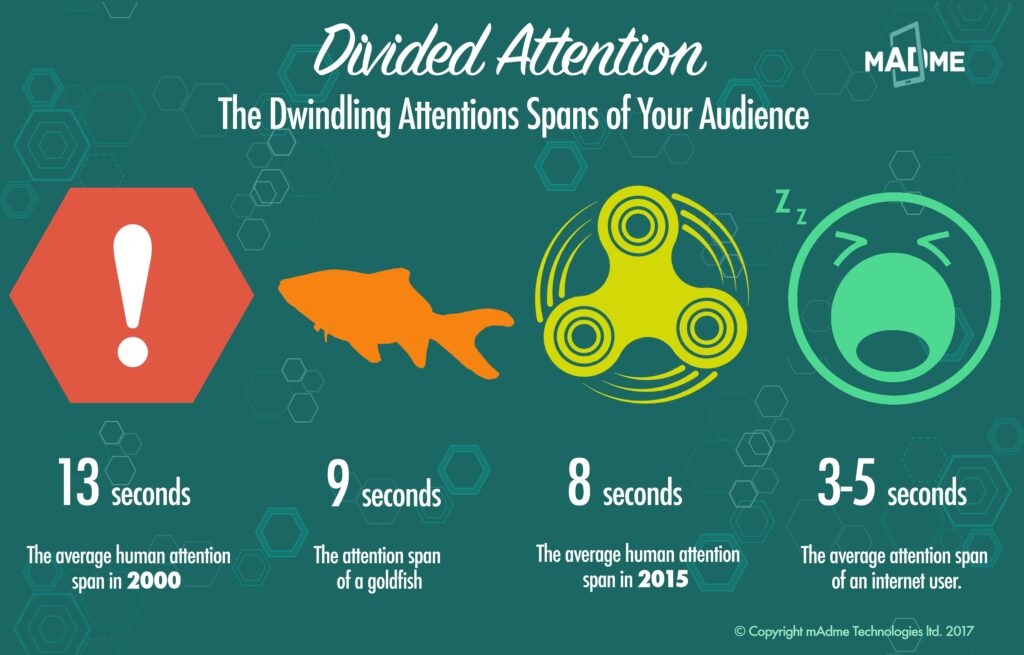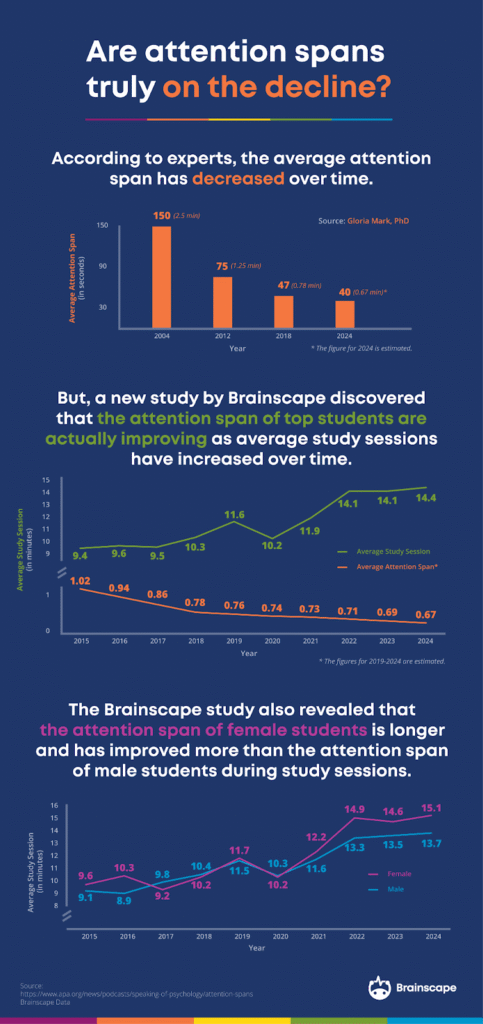Most of us scroll without even realizing what we’re doing. You pick up your phone for something quick—checking the time, replying to a message, or looking something up. But minutes later, you’re still on it. Caught in a loop of videos, memes, and updates.
You didn’t plan to spend half an hour on your screen. It just happened. That’s by design. Apps are built to hook your attention. They trigger your brain’s reward system, keeping you engaged far longer than intended. You scroll, swipe, like, repeat—and lose track of time.
But here’s the real cost: this habit trains your brain to crave constant stimulation. It becomes harder to sit still, focus, or think deeply. Your attention, once sharp and deliberate, becomes scattered. This isn’t just a time problem—it’s a thinking problem. In a world built to distract you, learning to upgrade your attention span is the smartest upgrade you can make.
Dopamine Overload: How Phones Hijack Your Brain
Every like, comment, swipe, or new post gives your brain a tiny hit of dopamine. Dopamine is the brain’s “feel good” chemical. It’s released when something rewarding happens. Your brain loves it—and starts chasing it.
Over time, your brain gets used to this steady stream of quick rewards. Scroll. Click. Swipe. Repeat. Each action triggers more dopamine. And your brain learns: “This is what feels good.”
But here’s the problem. When your brain is wired for instant rewards, everything else starts to feel dull. Reading a textbook doesn’t give that fast dopamine hit. Neither does writing an essay or solving a tough math problem. These tasks take effort and patience.
They reward you slowly. So your brain resists. It feels bored. Restless. You get the urge to check your phone again. Just for a second. But the cycle restarts. This is how phones hijack your attention. Not because you’re lazy or undisciplined.
But because your brain is adapting to a new normal—constant stimulation. In this dopamine economy, your attention is the price. And every time you trade deep focus for shallow scrolling, your ability to concentrate shrinks a little more. Breaking the cycle starts with awareness—and a reset.

Attention Is Energy. Protect It Like Gold.
Your attention is like your phone battery. It starts the day full, but every task, swipe, or notification drains it. The more distractions you allow, the faster it runs out. Here’s the catch—unlike your phone, you can’t just plug in and recharge in an hour.
Mental energy takes time to restore. Sleep, rest, quiet moments—these are your chargers. And even then, recovery isn’t instant. Every time you switch between apps, check your phone mid-task, or answer messages while studying, you lose a bit of that precious energy.
It’s called attention residue—your mind stays stuck in the last task even after moving on. This lowers your efficiency and burns more energy than you realize. Focus is not unlimited. It’s a limited daily resource.
And in a world that constantly competes for your attention, protecting it becomes a superpower. You wouldn’t waste your phone battery before an important call. So why waste your mental energy before deep work? Set boundaries. Say no to unnecessary notifications.
Create quiet blocks of time. In 2025, the people who thrive won’t be the busiest. They’ll be the ones who know how to guard and upgrade your attention span like gold—and spend it with purpose.
Multitasking: The Brain Shrinker
Multitasking sounds like a smart way to get more done. Answer emails while studying. Scroll social media during a lecture. Jump between tabs, apps, and messages. But here’s the truth: it’s a trap.
Research from Stanford and MIT reveals a surprising fact—chronic multitaskers perform worse than people who focus on one thing at a time. They make more mistakes. They struggle to filter out distractions. And their memory suffers.
Even more alarming, brain scans show that heavy multitaskers have reduced gray matter in areas linked to focus, decision-making, and emotional control. That means multitasking doesn’t just hurt your performance—it can physically change your brain for the worse.
Why does this happen? Because your brain isn’t built to handle multiple streams of attention at once. What feels like multitasking is actually rapid task-switching. Each switch burns mental energy.
Each interruption leaves behind what researchers call attention residue—a trail of leftover thoughts that makes it harder to fully concentrate on the next task. The more you multitask, the more your brain gets used to distraction.
Over time, this scattered state becomes your default. You feel busy but unfocused. Active but unproductive. The solution is simple but powerful: single-tasking. Focus on one thing at a time. Create deep work sessions—blocks of 30 to 60 minutes with no distractions.
Close extra tabs. Silence notifications. Give your full attention to the task in front of you. This trains your brain to go deep again. It rebuilds your cognitive strength. It sharpens your ability to think, solve, and remember.
Multitasking may feel like a shortcut. But in reality, it shrinks your potential. Single-tasking is the way forward—for your brain, your performance, and your peace of mind.
Dopamine Reset: The 3-Minute Fix To Upgrade Your Attention Span
Here’s the good news: You don’t need a silent retreat to reset your brain. Just three minutes of stillness and breath can make a big difference. Every few hours, try this: Step away from your phone. Sit or stand comfortably. Close your eyes or soften your gaze.
Inhale slowly for 4 seconds. Exhale gently for 6 seconds. Repeat this for 3 minutes. Just breathe. That’s it. No apps. No techniques. Just quiet breathing. This short break gives your brain a chance to reset.
It lowers the constant flood of dopamine triggered by scrolling, swiping, and multitasking. Your mind moves from “always-on” mode to a calmer, more focused state. Think of it like restarting your mental operating system. You clear out the noise. You come back to center.
Science supports this. Even brief periods of mindful breathing reduce cortisol—the stress hormone—and calm the nervous system. Your heart rate slows. Your attention sharpens. Your brain regains balance. It’s simple. It’s free. And it works.
In a world of constant stimulation, stillness is powerful. These small resets protect your focus. They restore clarity. And over time, they train your brain to stay grounded—even when the world pulls at your attention.
The 20-Minute Rule: A Simple Shift To Upgrade Your Attention Span
Want better sleep? Sharper focus? Less stress? Try this one rule: No phone 20 minutes before studying or sleeping. It’s simple, but powerful. Your brain needs time to shift gears—from stimulation to rest, or from distraction to focus.
That final scroll before bed, or a quick video before you study? It might seem harmless. But it floods your brain with dopamine and keeps your nervous system on high alert. That means it takes longer to fall asleep. And when you do, your sleep is lighter and less restorative.
If you’re trying to study, your brain is still wired for entertainment, not concentration. So instead of reaching for your phone, use those 20 minutes to slow down. Journal your thoughts. Breathe deeply and mindfully. Review your goals or to-do list.
Stretch or sit in silence. These simple habits help your brain transition into the right state—calm for sleep, alert for focus. The result? Deeper rest. Better memory. Clearer thinking. Your nervous system gets a break. Your attention gets stronger.
And your future self? They’ll thank you for every peaceful night and focused session you created—just by turning your phone off 20 minutes earlier.
Breath Is Power: Mindful Breathing Restores Balance
Your breath is your attention anchor. It’s always with you. It costs nothing. And it’s one of the most powerful tools to reset your brain. When you breathe slowly and mindfully, you activate the parasympathetic nervous system—your body’s natural “rest and digest” mode.
This shifts you out of the “fight or flight” state triggered by constant notifications, multitasking, and screen time. In just 2–3 minutes, mindful breathing can help your brain calm down. It slows your heart rate, lowers cortisol, and brings your attention back to the present moment.
And the science backs it up. Focused breathing before studying has been shown to improve attention span, working memory, comprehension, and even emotional regulation. Your brain becomes more balanced, clear, and ready to absorb information.
This isn’t about sitting in silence for an hour. It’s not about perfection. It’s about learning to pause—on purpose. Before a study session. Before an exam. Before your mind starts racing. Even a few intentional breaths can create a powerful shift.
In a noisy world, your breath gives you control. It restores balance. It builds awareness. And most importantly, it helps you protect your most valuable resource: your attention.
A Real Story: From Scrolling to Speed Studying
Meet Riya, a college student preparing for her medical entrance exams. Like many, she struggled without realizing why. She studied for hours but couldn’t remember much. Her screen time was around 7 to 8 hours a day.
“I’d just check Instagram between chapters,” she said. But those quick checks turned into 45-minute scrolls without her noticing. Riya knew something had to change. With support, she tried a simple reset.
She stopped using her phone for 30 minutes after waking up and before going to bed. Every few hours, she took 3-minute breath breaks to reset her mind. She studied in focused 45-minute blocks with no multitasking. And she began tracking her screen time each week.
The results surprised her. In just four weeks, Riya cut her screen time in half. Her study retention speed doubled. “My brain felt clear for the first time in years,” she said. “I used to think I had a focus problem. Now I know it was a distraction problem.”
Riya’s story shows how small changes can lead to big improvements. It’s not about willpower. It’s about understanding how your brain works—and giving it what it needs to perform at its best.

This Is a Brain Upgrade—Not a Punishment
Let’s be clear: this isn’t about being “disciplined” or giving up technology completely. It’s not about forcing yourself to quit cold turkey or feeling guilty for using your phone. Instead, it’s about upgrading how you use your brain. Struggling to focus isn’t a sign of weakness.
It’s a natural response. Your brain is adapting exactly as it should in a world filled with constant noise and distraction. This is how it’s wired to survive and seek stimulation. But now, you have a choice. You can keep feeding your brain with endless distraction.
Or you can start rewiring it for clarity, calm, and deep focus. When you reduce digital overload, take mindful breathing breaks, and protect your attention, something amazing happens. You don’t just think better—you feel better. Your sleep improves.
Your learning speeds up. Your ability to connect with others deepens. This isn’t punishment. It’s a gift you give yourself. It’s power. Power over your mind. Power to choose where your attention goes. Power to live with intention, not distraction.
This upgrade is the real key to thriving in a world designed to steal your focus. And it starts with one simple step: deciding to train your attention to upgrade your attention span.
The Final Reminder: Train Your Attention To Upgrade Your Attention Span
If there’s one thing to take away from this article, it’s simple: Train your attention to upgrade your attention span. It’s your real power in a world full of distractions. Your future depends on it. So does your creativity and performance.
When everyone else is scattered, your ability to focus deeply sets you apart. This doesn’t mean you have to be perfect. It means being intentional. Taking control, one moment at a time. One breath when your mind wanders. One boundary when the phone tempts you.
One no-scroll moment to reclaim your time. Each small choice adds up. Each pause strengthens your brain. Each moment of focus builds your power. The upgrade isn’t far off. It’s right here, waiting for you. Are you ready to stop scrolling and start thinking sharper? Your attention is your greatest asset. Protect it. Train it. Own it.
FAQs on “The Attention Upgrade: How to Stop Scrolling and Start Thinking Sharper”:
What is the “attention upgrade”?
It means improving your ability to focus deeply by managing distractions and digital overload.
Why do we scroll without realizing it?
Social media and apps are designed to keep us engaged, often leading to unconscious, habitual scrolling.
How does dopamine affect attention?
Dopamine floods from notifications and likes create a craving for quick rewards, making deep focus harder.
Is attention really a limited resource?
Yes, your brain’s ability to focus has a finite energy that depletes with constant stimulation.
How does multitasking harm the brain?
Multitasking fragments focus, reduces memory, and can shrink brain areas responsible for attention.
What is a dopamine reset?
A short break of mindful breathing to lower dopamine levels and calm the brain.
How long should a dopamine reset last?
Just 2 to 3 minutes of focused breath can help reset your attention.
What is the 20-minute no-phone rule?
Avoid using your phone 20 minutes before studying or sleeping to improve focus and rest.
Can mindful breathing really improve focus?
Yes, it activates the parasympathetic nervous system, reducing stress and sharpening attention.
How often should I take mindful breath breaks?
Every few hours during your day to maintain mental clarity.
Is this approach about discipline or punishment?
No, it’s about upgrading your brain’s function—not about being strict or giving up technology.
How quickly can I see results from these changes?
Some notice improvements within weeks, like better focus and reduced screen time.
What if I feel overwhelmed by digital distractions?
Start small with simple steps like breath breaks and no-phone times to gradually regain control.
Can reducing screen time help with sleep?
Yes, less phone use before bed helps your brain wind down and improves sleep quality.
Why is single-tasking better than multitasking?
Single-tasking allows deeper focus and better memory formation.
Can these strategies help students improve study habits?
Absolutely, many students see faster learning and retention with better attention management.
Is meditation necessary to improve focus?
No, even brief mindful breathing or short pauses can significantly boost focus.
How does tracking screen time help?
It raises awareness about habits and motivates you to reduce unnecessary usage.
What if I slip back into scrolling?
That’s normal—progress is about consistent effort, not perfection.
How do I maintain this attention upgrade long-term?
Make mindful breaks and phone boundaries regular habits, and keep practicing intentional focus daily.
~Authored by Ameya Satam





